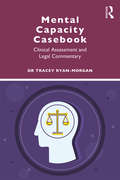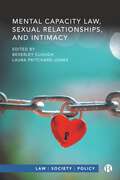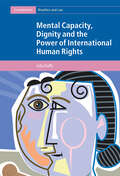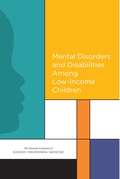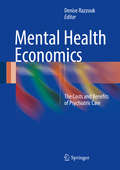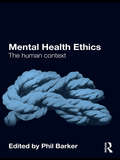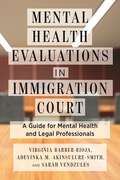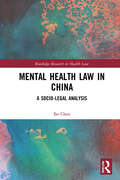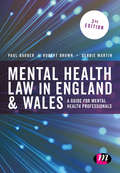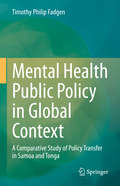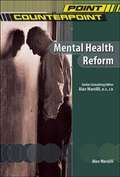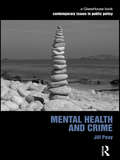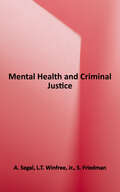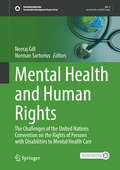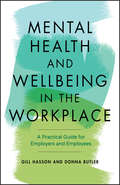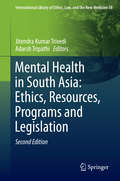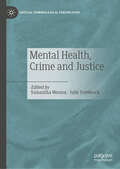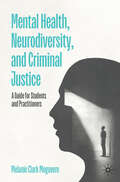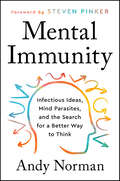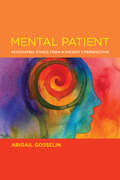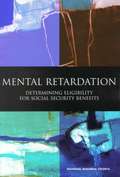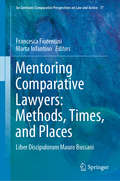- Table View
- List View
Mental Capacity Casebook: Clinical Assessment and Legal Commentary
by Tracey Ryan-MorganThe Mental Capacity Act 2005 (MCA) provides a legal framework for acting on behalf of individuals who lack the capacity to make decisions for themselves. The Mental Capacity Casebook showcases numerous real-life case studies in accordance to this Act. Through the exploration of various mental capacity assessments, this book highlights the psychological needs of the individuals who are supported and protected by the MCA. Dr. Tracey Ryan-Morgan, a Consultant Clinical Neuropsychologist, is the first to bridge the gap between the individual’s psychological requirements and the legal framework surrounding them. Not only does this book present true, often complex, mental capacity assessments, it does so with legitimate corresponding commentaries. Each case outlines the presented problem along with its background, social context, psychological matters, the overriding opinion and concluding learning points. This book provides a unique standpoint, offering insight into the complexities of the Act and practical guidance on how to conduct assessments. It serves as essential reading for those looking for guidance whilst making complex capacity decisions, such as Clinical Neuropsychologists, Social Workers, and Legal Professionals.
Mental Capacity Law, Sexual Relationships, and Intimacy (Law, Society, Policy)
by Karen Brennan Andrea Hollomotz Alex Ruck Keene Hannah Morgan Ralph Sandland Claire Bates Neil Allen Jaime Lindsey Allegra Enefer Alan Cusack Becky Squires Oluwatoyin Sorinmade Carmelle Peisah Lorraine CurrieQuestions as to the mental capacity of an individual to consent to sex are an increasingly important aspect of legal scholarship and professional practice for those working in care. Recent case law has added new layers of complexity, requiring that a person must be able to understand that the other person needs to consent and can withdraw that consent. While this has been welcomed for asserting the importance of the interpersonal dynamics of sex, it has significant implications for practice and for the day-to-day lives of people with cognitive impairments. This collection brings together academics, practitioners and organizations to consider the challenges posed by the current legal framework, and future directions for law, policy and practice.
Mental Capacity, Dignity and the Power of International Human Rights (Cambridge Bioethics and Law)
by Julia DuffyPersonhood, in liberal philosophical and legal traditions, has long been grounded in the idea of autonomy and the right to legal capacity. However, in this book, Julia Duffy questions these assumptions and shows how such beliefs exclude and undermine the rights of adults with cognitive disability. Instead, she reinterprets the right to legal capacity through the principle of the interdependence and indivisibility of human rights. In doing so, she compellingly argues that dignity and not autonomy ought to be the basis of personhood. Using illustrative case studies, Duffy demonstrates that the key human rights values of autonomy, dignity and equality can only be achieved by fulfilling a range of interdependent human rights. With this innovative book challenging common assumptions about human rights and personhood, Duffy leads the way in ensuring civil, economic, political, social, and cultural inclusion for adults with cognitive disabilities.
Mental Disorders and Disabilities Among Low-Income Children
by Thomas F. BoatChildren living in poverty are more likely to have mental health problems, and their conditions are more likely to be severe. Of the approximately 1. 3 million children who were recipients of Supplemental Security Income (SSI) disability benefits in 2013, about 50% were disabled primarily due to a mental disorder. An increase in the number of children who are recipients of SSI benefits due to mental disorders has been observed through several decades of the program beginning in 1985 and continuing through 2010. Nevertheless, less than 1% of children in the United States are recipients of SSI disability benefits for a mental disorder. At the request of the Social Security Administration, "Mental Disorders and Disability Among Low-Income Children" compares national trends in the number of children with mental disorders with the trends in the number of children receiving benefits from the SSI program, and describes the possible factors that may contribute to any differences between the two groups. This report provides an overview of the current status of the diagnosis and treatment of mental disorders, and the levels of impairment in the U. S. population under age 18. The report focuses on 6 mental disorders, chosen due to their prevalence and the severity of disability attributed to those disorders within the SSI disability program: attention-deficit/hyperactivity disorder, oppositional defiant disorder/conduct disorder, autism spectrum disorder, intellectual disability, learning disabilities, and mood disorders. While this report is not a comprehensive discussion of these disorders, "Mental Disorders and Disability Among Low-Income Children" provides the best currently available information regarding demographics, diagnosis, treatment, and expectations for the disorder time course - both the natural course and under treatment.
Mental Health Economics
by Denise RazzoukThe main objective of this work is to provide a book with high quality content that becomes a reference and support for graduate course (Mental Health, Public Health and Epidemiology) and for research in the domain of health economics applied to mental health. Also this book might be useful for policymakers on formulating mental health policies. Key messages of this book are based on: a) mental illness represent a huge cost for society and for health care; b) health economics applied to mental health could help in the optimization of resource allocation for mental health care and for better decision making in terms of balancing costs and benefits; c) interventions and treatment should be also chosen in general medical practice and in public decision-policy according to cost-effectiveness, burden of disease and equity principles; d) quality of care is related with better outcomes, higher quality of life for clients, and with lower costs for society and health system (best value for money); e) it is possible to decrease the burden of mental disorders with cost-effective treatments. The book is divided in four main topics: 1. Introduction to Health Economics applied to Mental Health - this section is an overview of basic principles, concepts and methods used in Economics and Health Economics to enable students to make critical appraisal of Health Economics texts and also to design research studies in this topic. 2. Health Economics applied to the evaluation of quality and costs of Mental Health Services - this section presents results of Brazilian studies on the costs of mental health care (hospital, outpatient care, residential care, informal care), methods on the measurement of costs and it discusses issues related with public policies decisions and quality of mental health car in the low and middle income countries context. There is also an overview of quality indicators of mental health care and instruments to evaluate mental health services and costs. 3. Health Economics applied to evaluate treatment of mental disorders - This section presents a review of cost-effectiveness of pharmacological treatments and other interventions applied for treating the most burdensome mental disorders such as depressive and anxiety disorders, bipolar disorders, psychosis, alcohol and drug disorders, dementia, and hyper attention deficit disorders. 4. Health Economics, burden and indirect costs of mental disorders - This section highlights the social and economic burden caused by mental illness under societal perspective focusing on stigma, unemployment, indirect costs in the workplace (absenteeism and presenteeism), the relationship between poverty and mental disorders, global health and social determinants of mental health and on the costs of mental disorders (depression, anxiety, psychosis, alcohol and drug disorders). We present some instruments to measure indirect costs of mental disorders.
Mental Health Ethics: The Human Context
by Phil BarkerAll human behaviour is, ultimately, a moral undertaking, in which each situation must be considered on its own merits. As a result ethical conduct is complex. Despite the proliferation of Codes of Conduct and other forms of professional guidance, there are no easy answers to most human problems. Mental Health Ethics encourages readers to heighten their awareness of the key ethical dilemmas found in mainstream contemporary mental health practice. This text provides an overview of traditional and contemporary ethical perspectives and critically examines a range of ethical and moral challenges present in contemporary ‘psychiatric-mental’ health services. Offering a comprehensive and interdisciplinary perspective, it includes six parts, each with their own introduction, summary and set of ethical challenges, covering: fundamental ethical principles; legal issues; specific challenges for different professional groups; working with different service user groups; models of care and treatment; recovery and human rights perspectives. Providing detailed consideration of issues and dilemmas, Mental Health Ethics helps all mental health professionals keep people at the centre of the services they offer.
Mental Health Evaluations in Immigration Court: A Guide for Mental Health and Legal Professionals (Psychology and Crime)
by Virginia Barber-Rioja Adeyinka M. Akinsulure-Smith Sarah VendzulesPROSE Award- Psychology FinalistA timely and important contribution to the study of immigration court from a psychological perspectiveEvery day, large numbers of immigrants undertake dangerous migration journeys only to face deportation or “removal” proceedings once they arrive in the U.S. Others who have been in the country for many years may face these proceedings as well, and either group may seek to gain lawful status by means of an application to USCIS, the benefits arm of the immigration system. Mental Health Evaluations in Immigration Court examines the growing role of mental health professionals in the immigration system as they conduct forensic mental health assessments that are used as psychological evidence for applications for deportation relief, write affidavits for the court about the course of treatment they have provided to immigrants, help prepare people emotionally to be deported, and provide support for immigrants in detention centers. Many immigrants appear in immigration court—often without an attorney if they cannot afford one—as part of deportation proceedings. Mental health professionals can be deeply involved in these proceedings, from helping to buttress an immigrant’s plea for asylum to helping an immigration judge make decisions about hardship, competency or risks for violence. There are a whole host of psycho-legal and forensic issues that arise in immigration court and in other immigration applications that have not yet been fully addressed in the field. This book provides an overview of relevant issues likely to be addressed by mental health and legal professionals. Mental Health Evaluations in Immigration Court corrects a serious deficiency in the study of immigration law and mental health, offering suggestions for future scholarship and acting as a vital resource for mental health professionals, immigration lawyers, and judges.
Mental Health Law in China: A Socio-legal Analysis (Routledge Research in Health Law)
by Bo ChenThis book provides an important critique of mental health law and practice in China, with a focus on involuntary detention and treatment. The work explores China’s mental health law reform regarding treatment decision-making in the new era of the UN Convention on the Rights of Persons with Disabilities (CRPD). It adopts a socio-legal approach, not only by undertaking a comprehensive desk-based analysis of the reforms introduced by China’s Mental Health Law (MHL) but also examining its implementation based on evidence from practice. The book seeks to investigate whether China’s first national MHL takes a step closer to the requirements of the UN Convention on the Rights of Persons with Disabilities on mental health treatment decision-making, and, if not, why not? The book will be of interest to those working in the areas of mental health law and policy, medical law and disability, human rights law, and Asian Studies.
Mental Health Law in England and Wales: A Guide for Mental Health Professionals (Third Edition) (Mental Health in Practice Series)
by Paul Barber Debbie Martin Dr Robert A BrownThis is a complete guide to the Mental Health Act 1983, and is a comprehensive and up-to-date reference guide for any mental health professional – from social workers, psychologists and occupational therapists, to doctors and nurses. The book aims to simplify mental health law so that it’s accessible to busy professionals at all stages of practice as well as those affected by mental health law. <p><p> Key chapters include details on who operates the Act, who is affected by it, how people may be subject to compulsion, how the law governs issues of capacity and consent to treatment, how to appeal against compulsion, and the role of the nearest relative. There are also important chapters on advocacy, children and human rights issues, as well as extensive appendices, which provide access to the 1983 Act itself, important rules and regulations and a summary of key cases that have been decided by the courts.
Mental Health Public Policy in Global Context: A Comparative Study of Policy Transfer in Samoa and Tonga
by Timothy Philip FadgenThis book explores the development of mental health systems in the Pacific Island Countries (PICs) of Samoa and Tonga through an examination of several policy transfer events from the colonial to the contemporary. Beginning in the 1990s, mental health became an area of global policy concern as reflected in concerted international organisation and bilateral aid and development agendas, most notably those of the World Bank, World Health Organization, and the governments of Australia and New Zealand. This book highlights how Tonga and Samoa both reformed their respective mental health systems during these years, after relatively long periods of stagnation.Using recent scholarship concerning public policy transfer, this book explains these policy outcomes and expands it to include consideration of the historical institutional dimensions evidenced by contemporary mental health systems. This book considers three distinct levels of policy implicated in mental health system transfer processes from developed to developing nations: colonial authority and influence; decolonisation processes; and the global development agenda surrounding health systems. In the process, the author argues that there are in fact three levels of policy change that must be accounted for in examining contemporary policy change. These policy levels include formal policy transfers, which tend to be prescriptive, involving professional problem construction and the designation of appropriate state apparatus for curative or custodial care provision; quasi-formal transfers, which tend to be aspirational and involve policy instruments developed through collaborative, participatory processes; and informal transfers that tend to be normative and include practices by professional actors in delivering service merged with traditional cultural beliefs as to disease aetiology as well as reflecting a deep understanding of the cultural context within which the services will be delivered. This book argues that a renewed focus on the importance of public policy and government institutional capacity is necessary to ensure human rights and justice are secured.
Mental Health Reform (Point Counterpoint)
by Alan MarzilliEach book in this series offers all the statutes, legal opinions, and studies a student needs to structure a cohesive argument on a given controversial topic. Issues are presented from multiple points of view; sidebars cite law and opinions to aid in critical analysis; paratextual questions encourage reader engagement; and all sources are fully documented and grouped by the side of the argument. Discusses mental illness as a social problem: To what extent should persons with mental illness be contained in order to protect society? Can society afford not to bear the cost of treatment?
Mental Health and Crime (Contemporary Issues in Public Policy)
by Jill PeayDoes mental disorder cause crime? Does crime cause mental disorder? And if either of these could be proved to be true what consequences should stem for those who find themselves deemed mentally disordered offenders? Mental Health and Crime examines the nature of the relationship between mental disorder and crime. It concludes that the broad definition of what is an all too common human condition – mental disorder – and the widespread occurrence of an equally all too common human behaviour – that of offending – would make unlikely any definitive or easy answer to such questions. For those who offend in the context of mental disorder, many aspects of the criminal justice process, and of the disposals that follow, are adapted to take account of a relationship between mental disorder and crime. But if the very relationship is questionable, is the way in which we deal with such offenders discriminatory? Or is it perhaps to their benefit to be thought of as less responsible for their offending than fully culpable offenders? The book thus explores not only the nature of the relationship, but also the human rights and legal issues arising. It also looks at some of the permutations in the therapeutic process that can ensue when those with mental health problems are treated in the context of their offending behaviour.
Mental Health and Criminal Justice
by Jr. A. Segal L. T. Winfree S. FriedmanIn this student-friendly text, a team of respected scholars balances practical knowledge of how the mental healthcare system operates in conjunction with the criminal justice system, with an analytical framework that looks at how the quality of that collaboration is reflected in the issues, processes, and outcomes of both institutions. Professors and students will benefit from an accessible new text that informs and explores: - The role of mental healthcare law and procedure in the criminal justice system - How mentally ill clients are processed through the criminal justice system - Mental healthcare terms, resources, and treatment programs - Contemporary issues in mental health and criminal justice, such as the treatment of mentally ill juveniles inside the criminal justice system, and lack of full access to mental healthcare for at-risk groups - Discussion of systemic interface and entropy, two central themes to guide student analysis of issues and examples drawn from real life Mental Health and Criminal Justice is designed with a wealth of features for study and review, including: - Learning Objectives - Framing the Issues - Prologues and Epilogues that frame issues and provide vivid examples - Key Terms, highlighted in the text and defined in the Glossary - Text boxes that expand on points of interest - Summary and Chapter Review Questions at the end of each chapter
Mental Health and Human Rights: The Challenges of the United Nations Convention on the Rights of Persons with Disabilities to Mental Health Care (Sustainable Development Goals Series)
by Norman Sartorius Neeraj GillThis book discusses the challenges arising in the application of the United Nations Convention on the Rights of Persons with Disabilities (CRPD) in the provision of mental health care by presenting the views of the parties most directly concerned – people with lived experience of mental illness, their carers, psychiatrists, legal experts, public health workers and planners. Rather than talking about theory, the representatives of these groups express their views in relation to a series of case stories related to mental health in different countries and cultures. In addition to the presentation of views and arguments related to the case stories presented, there are descriptions of the application of the CRPD on mental health legislation in China, Egypt, Fiji, France, Georgia, Germany, Mexico and Scotland - countries differing in their legal tradition, income and level of resources invested into mental health care.
Mental Health and Wellbeing in the Legal Profession
by Emma Jones Neil GraffinLegal professionals are thought to have higher levels of mental health issues and lower levels of wellbeing than the general population. Drawing on qualitative data from new research with legal practitioners, this in-depth study of mental health and wellbeing in the UK and Republic of Ireland’s legal sector is a timely contribution to the urgent international debate on these issues. The authors present a comprehensive discussion of the cultural, structural and other causes of legal professionals’ compromised wellbeing. They explore the everyday demands and difficulties of the legal working environment and consider the impacts on individuals, the legal profession and wider society. Making comparisons with systems overseas, this is an invaluable resource that provides evidence-based suggestions for swift and effective organisational and policy-related interventions in the legal sector.
Mental Health and Wellbeing in the Workplace: A Practical Guide for Employers and Employees
by Gill Hasson Donna ButlerProvides guidance for both employers and staff on promoting positive mental health and supporting those experiencing mental ill health in the workplace The importance of good mental health and wellbeing in the workplace is a subject of increased public awareness and governmental attention. The Department of Health advises that one in four people will experience a mental health issue at some point in their lives. Although a number of recent developments and initiatives have raised the profile of this crucial issue, employers are experiencing challenges in promoting the mental health and wellbeing of their employees. Mental Health & Wellbeing in the Workplace contains expert guidance for improving mental health and supporting those experiencing mental ill health. This comprehensive book addresses the range of issues surrounding mental health and wellbeing in work environments – providing all involved with informative and practical assistance. Authors Gill Hasson and Donna Butler examine changing workplace environment for improved wellbeing, shifting employer and employee attitudes on mental health, possible solutions to current and future challenges and more. Detailed, real-world case studies illustrate a variety of associated concerns from both employer and employee perspectives. This important guide: Explains why understanding mental health important and its impact on businesses and employees Discusses why and how to promote mental health in the workplace and the importance of having an effective ‘wellbeing strategy’ Provides guidance on managing staff experiencing mental ill health Addresses dealing with employee stress and anxiety Features resources for further support if experiencing mental health issues Mental Health & Wellbeing in the Workplace is a valuable resource for those in the workplace wanting to look after their physical and mental wellbeing, and those looking for guidance in managing staff with mental health issues.
Mental Health in South Asia: Ethics, Resources, Programs and Legislation
by Jitendra Kumar Trivedi Adarsh TripathiAsia is by far the largest continent in the world in terms of area with population exceeding 3. 5 billion and has dozens of cultures, religions, languages and ethnic groups. As a result of its highly varied political systems, Asia also spawns a wide variety of health care systems including mental health care systems, often based on historical roots and at times colonial heritages. The people who suffer from mental or neurological disorders in the continent form a vulnerable section of society and often face stigma, discrimination and marginalization in all societies, and this increases the likelihood that their human rights will be violated This book tackles the issue of mental health legislation in South Asia The first of its kind, it addresses an issue that is necessary for protecting the rights of people with mental disorders and serves as an essential text for reinforcing mental health policy in South Asia It is a timely addition to our global understanding of mental health and how different regions address it.
Mental Health, Crime and Criminal Justice: Responses and Reforms
by Jane Winstone<p>It has long been known that the pathway through the criminal justice system for those with mental health needs is fraught with difficulty. This interdisciplinary collection explores key issues in mental health, crime and criminal justice, including: offenders' rights; intervention designs; desistance; health-informed approaches to offending and the medical needs of offenders; psychological jurisprudence, and; collaborative and multi-agency practice. <p>This volume draws on the knowledge of professionals and academics working in this field internationally, as well as the experience of service users. It offers a solution-focused response to these issues, and promotes both equality and quality of experience for service users. It will be essential reading for practitioners, scholars and students with an interest in forensic mental health and criminal justice. </p>
Mental Health, Crime and Justice (Critical Criminological Perspectives)
by Samantha Weston Julie TrebilcockMental Health, Crime and Justice brings together original and state of the art contributions from theoretical, empirical, and policy-related scholarship concerned with the ways people with mental health illnesses are understood, ‘managed’, ‘controlled’ and responded to. Drawing on critical scholarship from a variety of disciplines, the collection pays careful attention to the controversial relationship between mental health and crime, as well as key issues relating to justice and social harm. It presents a synthesis of discipline-specific approaches, from law, psychiatry, sociology, and criminology, but will also bridge together developments in both theory and practice. The book explores the relationship between mental health and crime by deconstructing and analysing two important facets of the justice system: (1) the various ways in which people with mental disorder navigate and are navigated through the criminal justice (and forensic mental health) system(s); and (2) how so called ‘problematised populations’ are governed, with a particular emphasis on mental health as an unfolding dimension of social harm. Unique to this volume, well-rehearsed debates are cross-examined with contemporary critiques about social harm and justice. By considering the multifaceted dimensions of violence to include ‘gendered’, ‘structural’, and ‘systemic’, this book provides a nuanced insight that exposes the controversial relationship that is said to exist between mental health and crime. The collection seeks to highlight the harm and injustice that people with mental health disorders are subject to when interacting with the criminal justice system.
Mental Health, Legal Capacity, and Human Rights
by Vikram Patel Michael Ashley Stein Faraaz Mahomed Charlene Sunkel Juliana Lynn RestivoSince adoption of the Convention on the Rights of Persons with Disabilities and the interpretive General Comment 1, the topic of legal capacity in mental health settings has generated considerable debate in disciplines ranging from law and psychiatry to public health and public policy. With over 180 countries having ratified the Convention, the shifts required in law and clinical practice need to be informed by interdisciplinary and contextually relevant research as well as the views of stakeholders. With an equal emphasis on the Global North and Global South, this volume offers a comprehensive, interdisciplinary analysis of legal capacity in the realm of mental health. Integrating rigorous academic research with perspectives from people with psychosocial disabilities and their caregivers, the authors provide a holistic overview of pertinent issues and suggest avenues for reform.
Mental Health, Neurodiversity, and Criminal Justice: A Guide for Students and Practitioners
by Melanie Clark MogaveroThis book is a critical and thorough examination of the relationship between the criminal justice and mental health systems. The chapters cover a wide range of populations, focusing on those with neurodevelopmental disabilities, specifically autism and intellectual disability, mental illnesses such as post-traumatic stress disorder and schizophrenia, substance use disorders, and juveniles. This book covers the entire criminal justice process from initial contact, police questioning, the court system, community and custodial correctional systems, and the forensic mental health system. Specific topics addressed include community interactions and crisis intervention, comprehension of Miranda warnings, competency to stand trial, eyewitness identification procedures, admissibility of expert testimony, defenses of legal responsibility, community corrections, and ethical concerns with incarceration and eligibility for capital punishment. This book also covers the history and development of the criminal justice, juvenile justice, and mental health systems to contextualize modern-day policies and practices. With student-friendly features, current terminology, inclusive language, and key findings for criminal justice practitioners, this book serves as both a textbook and extensive reference for courses and for those seeking to learn more about these diverse populations and to have a positive impact. The content has international implications.
Mental Immunity: Infectious Ideas, Mind-Parasites, and the Search for a Better Way to Think
by Andy Norman“Mental Immunity is the perfect vaccine for the mind-viruses infecting our culture: alternative facts, fake news, and conspiracy thinking, to name a few.” —Michael Shermer, publisher of Skeptic magazine and author of The Believing BrainAstonishingly irrational ideas are spreading. Covid denial persists in the face of overwhelming evidence. Anti-vaxxers compromise public health. Conspiracy thinking hijacks minds and incites mob violence. Toxic partisanship is cleaving nations, and climate denial has pushed our planet to the brink. Meanwhile, American Nazis march openly in the streets, and Flat Earth theory is back. What the heck is going on? And what can we do about it? In Mental Immunity, Andy Norman shows that these phenomena share a root cause. We live in a time when the so-called “right to your opinion” is thought to trump our responsibilities. The resulting ethos effectively compromises mental immune systems, allowing “mind parasites” to overrun them. Conspiracy theories, evidence-defying ideologies, garden-variety bad ideas: these are all species of mind parasite, and each of them employs clever strategies to circumvent mental immune systems. In fact, some of them compromise cultural immune systems—the things societies do to prevent bad ideas from spreading. Norman shows why all of this is more than mere analogy: minds and cultures really do have immune systems, and they really can break down. Fortunately, they can also be built up: strengthened against ideological corruption. He calls for a rigorous science of mental immune health—what he calls “cognitive immunology”—and explains how it could revolutionize our capacity for critical thinking.A practical guide to spotting and removing bad ideas, Mental Immunity is a stirring call to transcend our petty tribalisms, and a serious bid to bring humanity to its senses.
Mental Patient: Psychiatric Ethics from a Patient’s Perspective (Basic Bioethics)
by Abigail GosselinA philosopher who has experienced psychosis argues that recovery requires regaining agency and autonomy within a therapeutic relationship based on mutual trust.In Mental Patient, philosopher Abigail Gosselin uses her personal experiences with psychosis and the process of recovery to explore often overlooked psychiatric ethics. For many people who struggle with psychosis, she argues, psychosis impairs agency and autonomy. She shows how clinicians can help psychiatric patients regain agency and autonomy through a positive therapeutic relationship characterized by mutual trust. Patients, she says, need to take an active role in regaining their agency and autonomy—specifically, by giving testimony, constructing a narrative of their experience to instill meaning, making choices about treatment, and deciding to show up and participate in life activities. Gosselin examines how psychotic experience is medicalized and describes what it is like to be a patient receiving mental health care treatment. In addition to mutual trust, she says, a productive therapeutic relationship requires the clinician&’s empathetic understanding of the patient&’s experiences and perspective. She also explains why psychotic patients sometimes feel ambivalent about recovery and struggle to stay committed to it. The psychiatric ethics issues she examines include the development of epistemic agency and credibility, epistemic justice, the use of coercion, therapeutic alliance, the significance of choice, and the taking of responsibility. Mental Patient differs from straightforward memoirs of psychiatric illness in that it analyses philosophic issues related to psychosis and recovery, and it differs from other books on psychiatric ethics in that its analyses are drawn from the author&’s first-person experiences as a mental patient.
Mental Retardation: Determining Eligibility For Social Security Benefits
by Committee on Disability Determination for Mental RetardationCurrent estimates suggest that between one and three percent of people living in the United States will receive a diagnosis of mental retardation. Mental retardation, a condition characterized by deficits in intellectual capabilities and adaptive behavior, can be particularly hard to diagnose in the mild range of the disability. The U.S. Social Security Administration (SSA) provides income support and medical benefits to individuals with cognitive limitations who experience significant problems in their ability to perform work and may therefore be in need of governmental support. Addressing the concern that SSA’s current procedures are consistent with current scientific and professional practices, this book evaluates the process used by SSA to determine eligibility for these benefits. It examines the adequacy of the SSA definition of mental retardation and its current procedures for assessing intellectual capabilities, discusses adaptive behavior and its assessment, advises on ways to combine intellectual and adaptive assessment to provide a complete profile of an individual's capabilities, and clarifies ways to differentiate mental retardation from other conditions.
Mentoring Comparative Lawyers: Liber Discipulorum Mauro Bussani (Ius Gentium: Comparative Perspectives on Law and Justice #77)
by Marta Infantino Francesca FiorentiniThis volume features papers written in honor of Mauro Bussani, and celebrates the work and contributions of this renowned scholar of comparative law. The content reflects the various theoretical and practical areas in which he has already left a lasting mark. The essays explore the theory and practice of comparative law in different areas and contexts, and highlight innovative approaches to a large variety of hot-topic private and public law subjects. The authors include young scholars, lawyers, legal consultants, human rights activists, and practitioners, all of whom Professor Bussani has trained, supervised, and supported throughout their careers. The contributions emphasize the many ways in which Professor Bussani’s teaching and scientific output have enriched, revolutionized, and challenged both theory and practice. They cover e.g. the law of secured transactions, Western law and legal pluralism, fashion law, contract law in China and in the Arab World, contract and tort in the West, scientific evidence, risk regulation, global finance, human rights indicators, anti-discrimination laws, democracy and climate change law.
